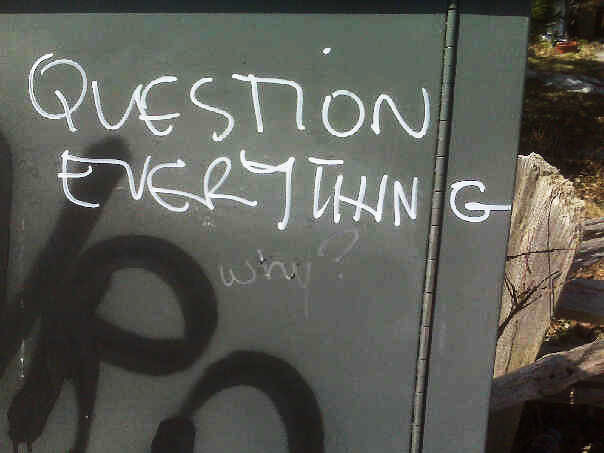Summer Philosophy Program Encourages Area High School Students To “Question Everything”

Photo: John Meadows (Flckr). (CC BY-NC-ND 2.0)
Source: UMass News and Media
At once a program name and life motto, Question Everything, a new residential summer program launching June 26 from the UMass Amherst Department of Philosophy, aims to make philosophical concepts and college more accessible to high school students from Holyoke and Springfield. Co-led by Julia Jorati, associate professor of philosophy, and Ned Markosian, professor of philosophy, the academic program will help make college feel like a possibility by providing high school students with a chance to experience university life while also improving their critical thinking and reasoning skills, and encouraging curiosity.
“High school is an age where students are questioning everything. They’re trying to figure out who they are, their place in their world. They’re thinking about big notions like social justice, and big, philosophical questions,” explains Jorati. “In school, they don’t get as many opportunities to explore these concepts, so it’s nice to give them a chance to think about these questions with like-minded peers.”
Question Everything was created for rising sophomores, juniors, and seniors from lower-income families, as well as students from marginalized groups underrepresented in higher education. It will provide a full scholarship to each participant to cover everything from room and board to transportation.
Though the program was originally set to begin in 2020, it was delayed due to the pandemic. This summer, the inaugural class will spend its two-week residency on the UMass Amherst campus studying identity and diversity, and exploring questions such as: “What makes you who you are?” “If you lost your memories, would you still be the same person?” “What are race and gender?”
“Julia and I see this partly as an opportunity to do community outreach in Springfield and Holyoke, partly as an opportunity to promote philosophy, and mostly as a chance to do philosophy with high school students, who always have lots of interesting ideas,” Markosian says.
In all, this first cohort for Question Everything will include between 10 and 20 participants depending on the results of its ongoing fundraising efforts through the UMass Amherst Minutefund, which closes March 10.
Question Everything mirrors a similar program currently led by Markosian called Philosophy in Public Schools (PiPS), which brings philosophy students from UMass and the other Five Colleges into K–12 classrooms throughout Western Massachusetts. In past semesters, students worked with second graders.
“When we’re discussing philosophy with these second graders, we’re getting them to consider, for example, the difference between right and wrong,” says Markosian. Although the elementary-aged students are not using terms such as utilitarianism, “they tend to come up with all of the leading theories in philosophy. It’s actually really fun!”
Both PiPS and Question Everything were inspired by the belief that children and teens are natural philosophers, a concept studied and advanced by the late Gareth Matthews, who taught at UMass Amherst from 1969 to 2005.
“When kids are young, they are asking philosophical questions. They’re asking, ‘Why everything?’ But their parents and teachers tend to try to drive that out of them,” Markosian explains.
Because Question Everything isn’t building on prior skills such as math or science, Jorati says, the curriculum “levels the playing field” for its students.
“They can feel free to just get creative without the pressure of grades and without it feeling as much like school,” she says. “[Question Everything] won’t just have lectures; we’ll have interactive activities, discussions, roleplay, debates, projects. We try to make it super fun and engaging.”
During the day, students will debate, research and explore philosophical concepts with their peers and instructors; by night, they’ll have the chance to access campus facilities and connect through social activities, such as movie nights and live performances.
“One of the big goals of this program is to give participants a taste of college,” Jorati says. “They’ll be trying out what it might be like to be a college student. That can be extremely transformative and powerful, to picture themselves as potential students. That’s one of our big goals.”
As for those who may wonder why it’s important to bring philosophy to children and teens, Markosian explains their programs help to foster empathy and understanding, allowing individuals to better process opposing perspectives.
“We emphasize listening to other people, their views and their reasons,” Markosian says. “If that practice was more of a national thing, I think that could be a very good thing for society.”
Jorati calls philosophy and its emphasis on examining the human condition “intrinsically valuable.”
In addition to offering strong career options, she says, “Philosophy helps people think more critically and thoughtfully about everything. It’s important for democracy as well, to reflect on big questions about justice and equality.”
In addition to community donations, Question Everything will be partly funded by a grant from Mass Humanities.
To learn more, visit https://www.umass.edu/philosophy/question-everything. To donate, visit https://minutefund.umass.edu/project/29547.
